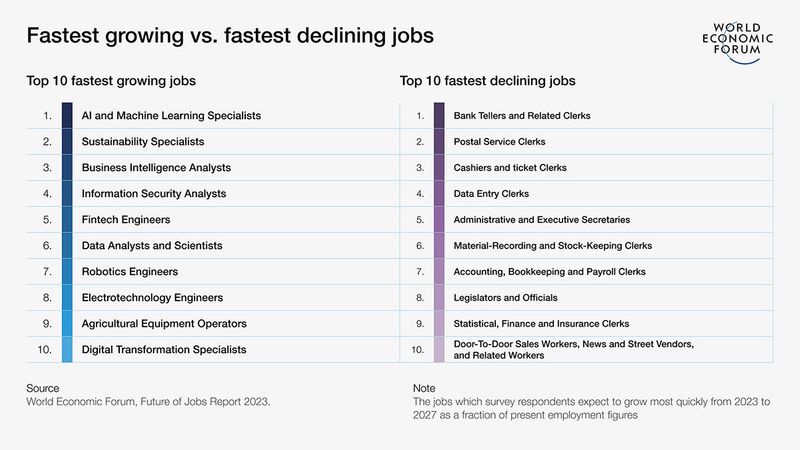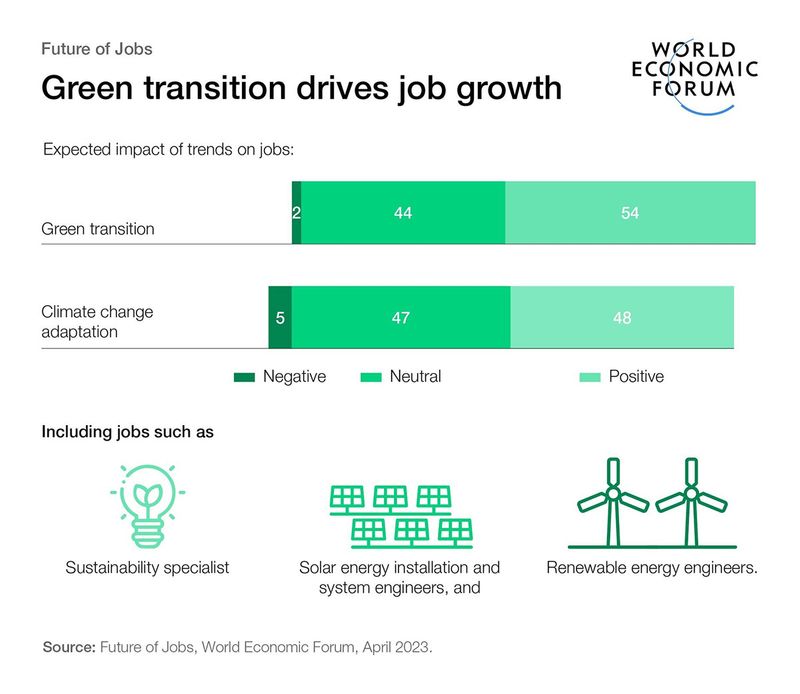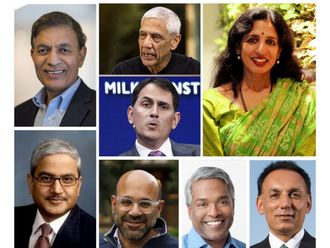
Highlights
- Technology will remain a key driver of business transformation in the next five years.
- Technology and AI feature highly on the likelihood of adoption
- 44% of workers’ skills will be disrupted in the next five years.
- Six in 10 workers will require training before 2027
- 45% per cent of businesses see funding for skills training
Geneva: Around a quarter of jobs are set to change in the next five years, according to a survey of employers published on Monday by the World Economic Forum (WEF), the organisation known for its annual meeting in Davos, Switzerland.
Some 69 million jobs will be created and and eliminate 83 million positions by 2027, it said. That will result in a net loss of 14 million jobs, equivalent to 2% of current employment, according to the Future of Jobs report.
The survey is based on input from some 800 companies employing more than 11 million workers and uses a dataset of 673 million jobs.
Tech and AI taking over jobs
Global labor markets are poised for a new era of turbulence as technologies like artificial intelligence accelerate the decline of clerical work, while simultaneously increasing demand for technology and cybersecurity specialists.
some 75% of surveyed companies said they expect to adopt AI technologies over the next five years, which they predict will eliminate up to 26 million jobs in record-keeping and administrative positions "- think cashiers, ticket clerks, data entry and accounting.
"Advancing technology adoption and increasing digitization will cause significant labour market churn," it said.
Fastest growing and declining jobs

The fastest declining roles will be secretarial and clerical roles such as bank tellers and cashiers which can be automated while demand for AI machine learning specialists and cybersecurity experts is expected to grow significantly, it said.
Jobs for agricultural professionals, especially Agricultural Equipment Operators, are expected to see an increase of around 30%, leading to an additional 3 million jobs. Growth is forecast in approximately 4 million digitally-enabled roles, such as E-Commerce Specialists, Digital Transformation Specialists, and Digital Marketing and Strategy Specialists.
Over the next five years, nearly a quarter of all jobs will change as a result of AI, digitization and other economic developments like the green energy transition and supply chain re-shoring, according to a report published by the World Economic Forum in Geneva on Monday.
While the study expects AI to result in "significant labor-market disruption," the net impact of most technologies will be positive over the next five years as big data analytics, management technologies and cybersecurity become the biggest drivers of employment growth.
The emergence of AI applications like ChatGPT, which uses machines to simulate human reasoning and problem solving, will have a particularly pronounced impact by displacing and automating many roles that involve reasoning, communicating and coordinating, the report said.
For now, AI remains a smaller threat to labor prospects than other macroeconomic factors like slower economic growth, supply shortages and inflation, the report said. Opportunities for job creation will likely come from investments that facilitate the green transition of businesses, the broader application of ESG standards and a broad reorientation of global supply chains, it said.
More skills for workers as green jobs grow
As scientists increasingly sound the alarm about the impacts of accelerating climate change and nature loss on our lives, the need to transform the global economy to run on clean energy, cut waste and reuse natural resources is becoming ever more urgent.
RAED MORE
To make that happen, we will have to change the way we work.

Economists say there are huge opportunities in acting fast to phase down the use of fossil fuels, reduce planet-heating emissions, protect forests and wildlife, and recycle materials.
Putting in place the policies and investments to move businesses and consumers onto a more sustainable path could create tens of millions of green jobs this decade, studies say.
But one key factor holding back the green economy, according to labour market experts, is a global lack of the skills required to build it, which are poorly understood and promoted.
The fast-expanding electric vehicle sector, for example, requires miners to provide the metals, assembly-line workers and engineers to make the cars and scooters, mechanics to maintain them, and urban planners to design green transport systems.
According to professional networking platform LinkedIn, green jobs are occupations that demand extensive knowledge of green skills, such as solar consultant and sustainability manager, but they accounted for only 1% of global hires in 2021.
In a 2022 report, LinkedIn also talked about "greening jobs" (9% of hires) and "greening potential jobs" (40% of hires), which it defines as those that can be performed without green skills but typically require some level of them.
Of the two, "greening job" workers have a higher intensity of green skills. Examples include heating and air-conditioning technicians, logistics managers and construction workers.
A 2023 study of 10 economies by the World Economic Forum calculated that to meet their environmental objectives, those countries - Australia, Brazil, Britain, China, Germany, India, Japan, South Africa, Spain and the United States - require at least 12 million more green jobs - or a 66% increase.

The greatest unmet need is in agriculture and forestry at 11 million jobs, it said, with other key sectors including infrastructure at 480,000 jobs, government at 160,000 and energy at 50,000.
There is also a global gender gap - with men more likely to have green skills than women, something that has barely changed in recent years. In 2021 there were only 62 women for every 100 men considered as green talent, according to LinkedIn.
For green skills, sustainable fashion was the fastest-growing globally - from designers and stylists to merchandisers - rising at an average of 90% per year in the same period.
Other examples are expertise in cleaning up oil spills, environmental services, water management and climate.
While green jobs and people with such skills are spread across most of the world, they tend to be concentrated in richer countries, such as the United States, Britain and Australia.
However, jobs in big emerging economies, such as India, Brazil, South Africa and Indonesia, also rely more on green skills than the global average.
Other concerns include the fact that there is often a mismatch between areas where fossil fuel mines or power plants are closing and new clean energy industries are springing up, as that makes it harder for workers to transition between roles.
And the quality of some jobs has been questioned, especially in developing countries with high levels of informal employment.
For example, in India, construction work on solar power plants is often temporary, leaving locals with few longer-term opportunities.








